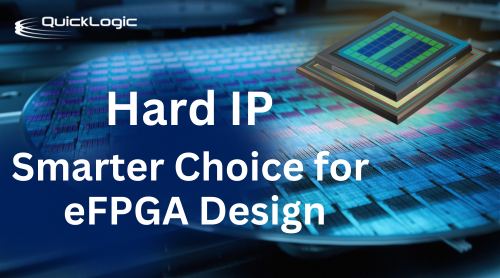Embedding FPGA technology into an ASIC or SoC has become popular for a wide variety of applications and markets, including those related to critical infrastructure, security, and defense. Engineers choose to integrate eFPGA IP into their SoCs for a number of reasons, including:
- Post-manufacturing design flexibility
- Reduced design risk
- Future proofing
- Customizable security and/or hardware acceleration
- Ability to quickly address adjacent applications and markets
Once someone has decided to move forward with an embedded FPGA design, they have a few decisions to make. One of the most important is whether to choose soft IP or hard IP.
The Soft IP approach has the advantage of slightly greater flexibility, as its parameters can be adjusted at the HDL level, then relatively easily integrated with the rest of the front-end design. However, the significant difficulty lies in the back-end design phase. FPGAs are homogeneous structures that need to be coupled tightly with the user place & route tool, to accurately represent the final user design that will go into the FPGA.
The Hard IP approach offers a number of substantial benefits over soft IP, especially in reducing:
- Development time
- Development cost
- Development risk
Unlike soft IP, which requires configuring RTL (register-transfer level) code for the host process, hard IP comes as pre-verified, silicon-proven blocks that can be directly integrated into a chip design. This approach minimizes the labor-intensive customization needed with soft IP, where engineers must ensure compatibility with specific manufacturing processes and meet performance goals.
With hard IP, much of this work is already accomplished, significantly accelerating the development timeline. Since hard IP blocks are pre-optimized for a target process node, they eliminate the need for extensive synthesis, timing, and power optimizations that would otherwise be necessary with soft IP. This optimization translates into faster design cycles, allowing engineering teams to focus on system-level design and innovation rather than spending time on IP-specific tuning.
Hard IP also reduces risk since it has a much lower probability of design errors. Hard IP blocks have been pre-validated for both functionality and reliability, reducing the chance of issues arising from process incompatibility or unforeseen interactions within the chip. In contrast, soft IP can introduce significant variability, particularly in areas such as timing closure, where errors may not appear until late in the development cycle. This reliability makes hard IP a safer choice for companies seeking to meet tight production schedules without compromising on quality.
Fortunately for designers, QuickLogic has the ability to quickly produce hard eFPGA IP for nearly any process node at any foundry, making choosing hard IP the best approach for most customers – and especially for those with mission critical applications.
Learn more here.

